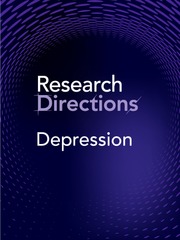Context
Much attention in recent years has focused on the extent to which the risk of metabolic disturbances, and most fundamentally of glucose and insulin, are prevalent among those treated for depressive and other mood disorders (Osimo et al., Reference Osimo, Perry, Cardinal, Lynall, Lewis, Kudchadkar, Murray, Perez, Jones and Khandaker2021; Scott et al., Reference Scott, Carpenter, Iorfino, Cross, Hermens, Gehue, Wilson, White, Naismith, Guastella and Hickie2019; Tickell et al., Reference Tickell, Rohleder, Ho, McHugh, Jones, Song, Hickie and Scott2022). Public concern has also focused on the increased rates of premature mortality in those with chronic depression and other major mental disorders, with a significant proportion of that risk being due to early-onset cardiovascular disease (particularly among women). A common assumption is that much of this risk is a consequence of medical treatments for depression, and their possible adverse effects such as increased risk of diabetes, presumably mediated by long-term weight gain.
However, more recent research, particularly among younger cohorts with less exposure to medical treatments challenges these assumptions (Scott et al., Reference Scott, Carpenter, Iorfino, Cross, Hermens, Gehue, Wilson, White, Naismith, Guastella and Hickie2019; Wilson et al., Reference Wilson, Carpenter, Crouse, Park, Koethe, Scott and Hickie2023). Here, there is a far less clear association between weight gain and blood glucose, but there does appear to be evidence of insulin resistance emerging early in the course of illness. A range of pathophysiological mechanisms have been suggested including immune activation, systemic inflammatory processes, circadian rhythm disturbances or Hypothalamic Pituitary Adrenal (HPA) axis dysfunction.
Other reports, typically based on middle-aged and more persistently depressed cohorts, have also suggested that metabolic disturbance is not simply a consequence of chronic illness or treatments but may be linked with specific depressive phenotypes (atypical depression, bipolar depression) or other specific underlying pathophysiological features (e.g. immune activation) (Lamers et al., Reference Lamers, Milaneschi, Vinkers, Schoevers, Giltay and Penninx2020; Milaneschi et al., Reference Milaneschi, Lamers, Berk and Penninx2020).
So, key research questions now focus on the direction of causation of observed metabolic, and most notably glucose and insulin, perturbations. Are these observed changes not simply a consequence of illness but potential early markers of particular depressive subtypes or specific pathophysiological mechanisms? How are they best measured, particularly if standard blood glucose measures are relatively insensitive? Is there evidence that such changes precede the onset of depressive disorders in youth, either alone or in combination with markers of perturbation in the immune, circadian or HPA-axis systems? Does effective early intervention reduce the chance of developing later metabolic perturbations? Are specific behavioural interventions or other non-specific dietary, physical activity or lifestyle changes sufficient to reduce metabolic risk in those with depressive disorders? Are some antidepressant or mood-stabilising therapies more likely than others to result in marked exacerbations of metabolic disturbances? Are there particular benefits to be derived from prescribing more specific metabolic medications such as metformin?
How to contribute to this Question
If you believe you can contribute to answering this Question with your research outputs, find out how to submit them in the Instructions for authors (https://www.cambridge.org/core/journals/research-directions-depression/information/author-instructions/preparing-your-materials). This journal publishes Results, Analyses, Impact papers and additional content such as preprints and “grey literature.” Questions will be closed when the editors agree that enough has been published to answer the Question so before submitting, check if this is still an active Question. If it is closed, another relevant Question may be currently open, so do review all the open Questions in your field. For any further queries, check the information pages (https://www.cambridge.org/core/journals/research-directions-depression/information) or contact this email (depression@cambridge.org).
Competing interests
The authors declare that there are no competing financial interests in relation to the work described. Potential conflicts of interest may arise from the following: IBH is the Co-Director, Health and Policy at the Brain and Mind Centre (BMC) University of Sydney. The BMC operates early-intervention youth services at Camperdown under contract to Headspace. He is the Chief Scientific Advisor to, and a 3.2% equity shareholder in, InnoWell Pty Ltd, which aims to transform mental health services through the use of innovative technologies. EMS is the Discipline Leader of Adult Mental Health, School of Medicine, University of Notre Dame; Research Affiliate, The University of Sydney; and Consultant Psychiatrist. She has received honoraria for educational seminars related to the clinical management of depressive disorders supported by Servier and Eli-Lilly pharmaceuticals. She has participated in a national advisory board for the antidepressant compound Pristiq, manufactured by Pfizer. She was the National Coordinator of an antidepressant trial sponsored by Servier.






